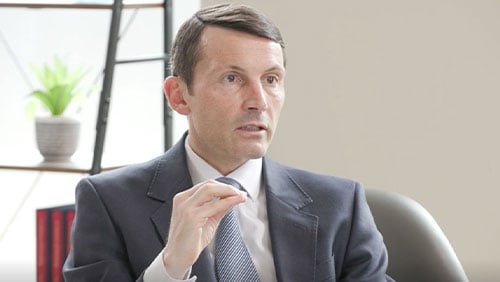October 2020
Article
Investing during a pandemic
James Anderson – Investment manager
James Anderson, joint manager of Scottish Mortgage Investment Trust, looks back on how, amid all the coronavirus disruption, the case for growth stocks strengthened as the crisis unfolded.

The value of shares in Scottish Mortgage, and any income from them, can fall as well as rise and investors may not get back the amount invested.
There’s a law in markets that the more uncertain the situation the more fund managers feel the need to pontificate. This is especially the case when a crisis is extreme in nature and far beyond the expertise of financial analysts. Why? It’s partly because clients, savers and the media want answers, but that desire is minor compared with that of investors to prove that they are in control by taking some, perhaps any, action. This isn’t a good idea. As a trustee of Johns Hopkins University, I feel in privileged touch with public health issues. But even Hopkins does not know what will ensue in medical terms – let alone in stock market consequences. We must respect uncertainty, not preach. Stress and short time frames are not auspicious omens of intelligent action.
So our default position was inaction. Did that work? It’s easy to twist events with hindsight, but what follows is an attempt to convey what was on our minds in recent months.
March
Each March I make a trek across America from east to west. I’ve found this an excellent process to observe the profoundly different mentalities at work, to mix companies and academia and to end up thousands of mental miles from the grime, greed and arrogance of Wall Street and Washington.
On my way I did a Scottish Mortgage presentation in London. Panic was already in the air. Stocks were falling indiscriminately. The audience also assured me that Scottish Mortgage was bound to be severely affected because it had been for several months in 2008–09. All I could really respond was that panics happen but that parallels are often misguided – and that subsequent returns after the Great Financial Crisis meant that we were justified in enduring the dark days. But although we certainly accepted that there might be months of pain, there was already a parallel with 2008–09 that we thought similar or even more central. The central banks of the world would flood markets with liquidity and commit to low interest rates for as far out as they could see. The discount rate for stocks would be falling and the competition from bonds would be minimal. That matters.
By the time I reached California, the previously insouciant American attitude to the pandemic had changed. I cut short my trip but not before a last meeting at Tesla. That was fortunate as it had a deep influence on my perspective. Although it was clear that the short term would be an unanticipated struggle, it was equally evident that Tesla was far better placed to first survive and then flourish than its traditional competitors. The parallel was with Amazon in 2008–09: it mattered far less that sales temporarily slowed than that the business models of others would never recover. The electric revolution would outlast the pandemic.
April
This felt the longest month. On a human level the news was terrible, with high death tolls in Europe and growing foreboding about the American response. We were all trying to adjust personally and professionally to lockdown life. There was constant pressure to take part in large internal meetings. I found it hard to insist with adequate calm that what circumstances demanded was quiet and lonely contemplation – and then comparing notes with my colleague Tom Slater.
But there was the stirring of opportunity. The simple observation that the pandemic was not only lowering the cost of capital but also improving the prospects of many of our companies. As so often in recent years Amazon was the earliest and clearest guide dog. Although it was too early to decipher the likelihood of permanent changes, it was already, well, obvious that Amazon was worth more, not less, than before the pandemic struck. It wasn’t logical for the shares to be lower. The stock market was panicking not weighing. That’s a good time to be an investor. Perhaps Amazon would again prove to be a great guide to broader opportunities.

May
So it proved. As spring moved onwards so did the evidence that the digital world was not just surviving but flourishing. This was the public information that we were now hearing from companies which we knew well, trusted and had been keen to tell of our long-term support through the crisis. With such companies, distant conversations work well – when you already understand each other, virtual communication is fine. For building new relationships, it’s harder. Both the business patterns and the relationships would strengthen in the coming months. This was apparent globally. From Mercado Libre in Latin America to Meituan Dianping in China via Zalando and Spotify in Europe, there was evidence of exciting progress.
June
We faced our own communications challenges. June is the focus month for shareholder meetings, forums and the AGM itself. We replaced these with many Zoom sessions. These allowed for larger audiences and many questions. That’s good. But sometimes the difficulty of conveying nuance and following up issues was frustrating for us and doubtless the audience.
In the early days of the pandemic there was a general presumption that life would be very hard for unquoted companies. Yet by June the shift in mood was palpable. So many of our venture investments are digital first, often tugging at new frontiers from virtual medicine to financial system reinvention, that their businesses leapt forward in often dramatic fashion. Pandemic notwithstanding, higher not lower valuations proliferated in funding rounds. From the mighty, such as Ant Group, to the apparently troubled, such as Airbnb, the lure of the IPO returned.
July
It’s been startling but wonderful to see the progress of so many of our companies in the crisis. But it comes with challenges. It’s still hard to discern how far pandemic-induced changes will persist. We need to resist the temptation to make wild generalisations born of temporary circumstances. We must concentrate on the core task of individual company research.
We also need to keep our mental balance. I’ve said that stress can provoke unusually bad decisions. So can over-confidence. Some of our companies have been transformed by favourable accident. We thought Zoom was an interesting company, but we did not foresee its leap to prominence. We thought CureVac a muddled and troubled unquoted biotech venture, not the apple of Mr Trump or the public market’s eye.
There’s a great deal of work to be done. But we do believe that the pandemic period is accelerating the process of change that we continually focus on in our portfolio. We see little road to recovery for supposed value stocks. If we can remain patient and disciplined the opportunities have only proliferated.

Annual past performance to 30 September each year (%)
| 2017 | 2018 | 2019 | 2020 | 2021 | |
| Scottish Mortgage Investment Trust | 30.4 | 29.0 | -6.4 | 97.8 | 44.5 |
| FTSE All-World Index | 15.5 | 13.4 | 7.8 | 5.7 | 22.7 |
Source: Morningstar, FTSE. Share price, total return. Past performance is not a guide to future returns.
If you would like to register to receive Trust magazine please visit www.bailliegifford.com/trust
About the author - James Anderson
Investment manager
James was the manager and then joint manager of Scottish Mortgage Investment Trust between 2000 and 2022. He was also a co-manager of the International Concentrated Growth and Global Outliers Strategies. James chaired the International Growth Portfolio Group from its inception in 2003 until July 2019 and was also Co-Manager of Vanguard International Growth. In 2003, James co-founded our Long Term Global Growth Strategy. Before that, he headed our European Equity team. James served as a member of the Advisory Board of the government-sponsored Kay Review and as Chair of the subsequent industry working group that set up the UK Investor Forum. He joined Baillie Gifford in 1983 and became a partner in 1987. James graduated BA in History from the University of Oxford, and after postgraduate study in Italy and Canada, he gained an MA in International Affairs in 1982. James is currently a Trustee of the Johns Hopkins University and Chairman of the Swedish investment company Kinnevik.
Risk Factors and Important Information
Investments with exposure to overseas securities can be affected by changing stock market conditions and currency exchange rates. Investing in emerging markets is only suitable for those investors prepared to accept a higher level of risk. This is because difficulties in dealing, settlement and custody could arise, resulting in a negative impact on the value of your investment. The trust has a significant exposure to unlisted investments. The trust’s risk could be increased as these assets may be more difficult to buy or sell, so changes in their prices may be greater.
The views expressed in this article should not be considered as advice or a recommendation to buy, sell or hold a particular investment. The article contains information and opinion on investments that does not constitute independent investment research, and is therefore not subject to the protections afforded to independent research.
Some of the views expressed are not necessarily those of Baillie Gifford. Investment markets and conditions can change rapidly, therefore the views expressed should not be taken as statements of fact nor should reliance be placed on them when making investment decisions.
Baillie Gifford & Co Limited is wholly owned by Baillie Gifford & Co. Both companies are authorised and regulated by the Financial Conduct Authority and are based at: Calton Square, 1 Greenside Row, Edinburgh EH1 3AN.
The investment trusts managed by Baillie Gifford & Co Limited are listed on the London Stock Exchange and are not authorised or regulated by the Financial Conduct Authority.
A Key Information Document is available by visiting www.bailliegifford.com
Source: London Stock Exchange Group plc and its group undertakings (collectively, the 'LSE Group'). © LSE Group 2021. FTSE Russell is a trading name of certain of the LSE Group companies. 'FTSE®' 'Russell®', is/are a trade mark(s) of the relevant LSE Group companies and is/are used by any other LSE Group company under license. All rights in the FTSE Russell indexes or data vest in the relevant LSE Group company which owns the index or the data. Neither LSE Group nor its licensors accept any liability for any errors or omissions in the indexes or data and no party may rely on any indexes or data contained in this communication. No further distribution of data from the LSE Group is permitted without the relevant LSE Group company’s express written consent. The LSE Group does not promote, sponsor or endorse the content of this communication.
Ref: 14056 10000697









